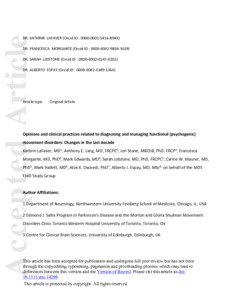LaFaver, K;
Lang, AE;
Stone, J;
Morgante, F;
Edwards, M;
Lidstone, S;
Maurer, CW;
Hallett, M;
Dwivedi, AK;
Espay, AJ;
et al.
LaFaver, K; Lang, AE; Stone, J; Morgante, F; Edwards, M; Lidstone, S; Maurer, CW; Hallett, M; Dwivedi, AK; Espay, AJ; MDS FMD Study Group
(2020)
Opinions and clinical practices related to diagnosing and managing functional (psychogenic) movement disorders: Changes in the last decade.
Eur J Neurol, 27 (6).
pp. 975-984.
ISSN 1468-1331
https://doi.org/10.1111/ene.14200
SGUL Authors: Edwards, Mark John James Morgante, Francesca
![[img]](https://openaccess.sgul.ac.uk/111771/6.hassmallThumbnailVersion/LaFaver_et_al-2020-European_Journal_of_Neurology.pdf)  Preview |
|
PDF
Accepted Version
Available under License ["licenses_description_publisher" not defined].
Download (4MB)
| Preview
|
Abstract
BACKGROUND: There is large variability in the diagnostic approach and clinical management in functional movement disorders (FMD). This study aimed to examine whether opinions and clinical practices related to FMD have changed over the past decade. METHODS: A survey to members of the International Parkinson and Movement Disorder Society (MDS). RESULTS: We received 864/7689 responses (denominator includes non-neurologists) from 92 countries. Respondents were more often male (55%), younger than 45 (65%), and from academic practices (85%). Although the likelihood of ordering neurological investigations prior to delivering a diagnosis of FMD was nearly as high as in 2008 (47% versus 51%), the percentage of respondents communicating the diagnosis without requesting additional tests increased (27% versus 19%; p=0.003), with most envisioning their role as providing a diagnosis and coordinating management (57% versus 40%; p<0.001). Compared to patients with other disorders, 64% of respondents were more concerned about missing a diagnosis of another neurological disorder. Avoiding iatrogenic harm (58%) and educating patients about the diagnosis (53%) were again rated as the most effective therapeutic options. Frequent treatment barriers included lack of physician knowledge and training (32%), lack of treatment guidelines (39%), limited availability of referral services (48%), and cultural beliefs about psychological illnesses (50%). The preferred term for communication favored "functional" over "psychogenic" (p<0.001). CONCLUSIONS: Attitudes and management of FMD have changed over the past decade. Important gaps remain in the education of neurologists about the inclusionary approach to FMD diagnosis, and improving access to treatment.
| Item Type: |
Article
|
| Additional Information: |
This is the peer reviewed version of the following article: LaFaver, K., Lang, A.E., Stone, J., Morgante, F., Edwards, M., Lidstone, S., Maurer, C.W., Hallett, M., Dwivedi, A.K. and Espay, A.J. (2020), Opinions and clinical practices related to diagnosing and managing functional (psychogenic) movement disorders: changes in the last decade. Eur J Neurol, 27: 975-984, which has been published in final form at https://doi.org/10.1111/ene.14200. This article may be used for non-commercial purposes in accordance with Wiley Terms and Conditions for Use of Self-Archived Versions. |
| Keywords: |
Functional movement disorders, conversion disorder, psychogenic movement disorders, survey, 1103 Clinical Sciences, 1109 Neurosciences, Neurology & Neurosurgery |
| SGUL Research Institute / Research Centre: |
Academic Structure > Molecular and Clinical Sciences Research Institute (MCS) |
| Journal or Publication Title: |
Eur J Neurol |
| ISSN: |
1468-1331 |
| Language: |
eng |
| Dates: |
| Date | Event |
|---|
| 15 May 2020 | Published | | 2 April 2020 | Published Online | | 3 March 2020 | Accepted |
|
| Publisher License: |
Publisher's own licence |
| PubMed ID: |
32153070 |
 |
Go to PubMed abstract |
| URI: |
https://openaccess.sgul.ac.uk/id/eprint/111771 |
| Publisher's version: |
https://doi.org/10.1111/ene.14200 |
Statistics
Item downloaded times since 11 Mar 2020.
Actions (login required)
 |
Edit Item |



